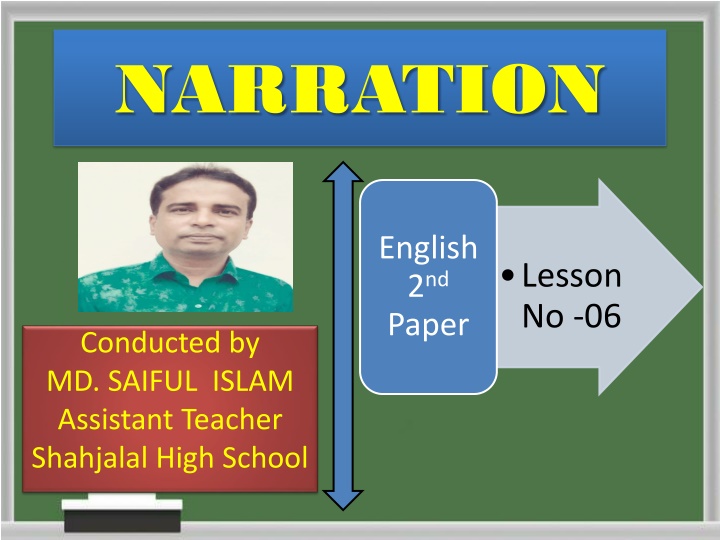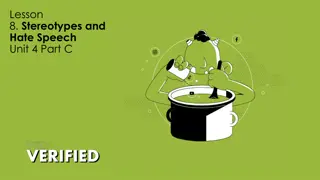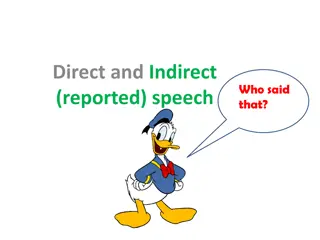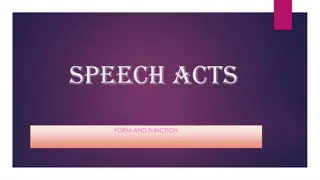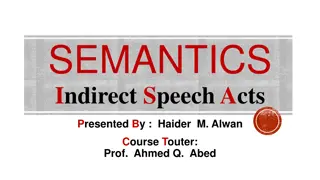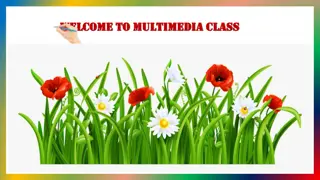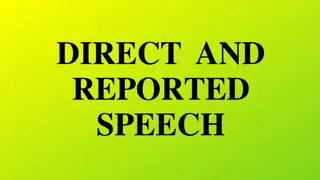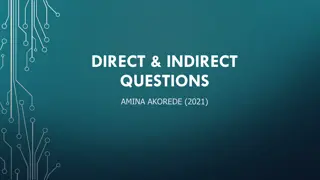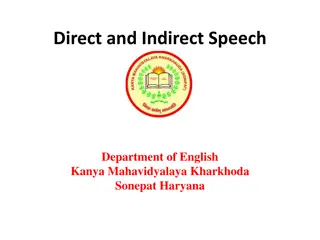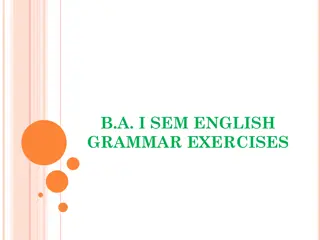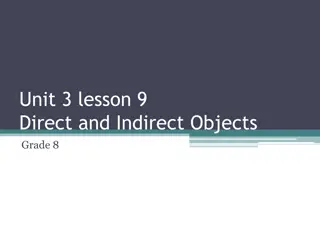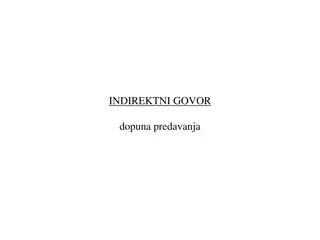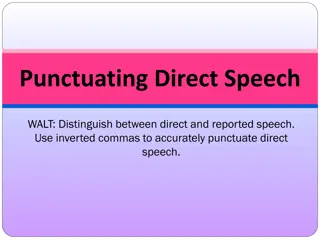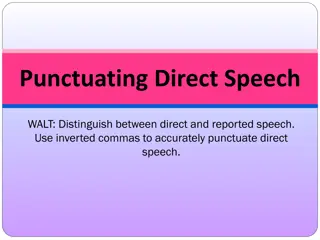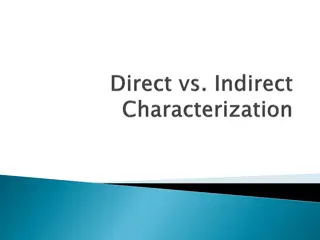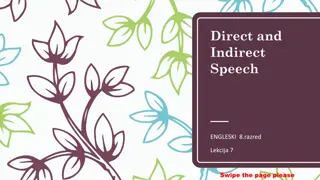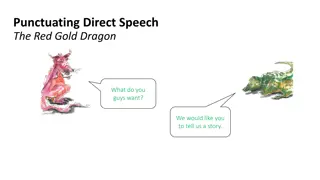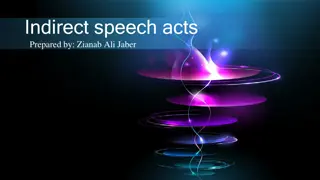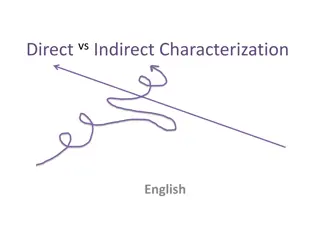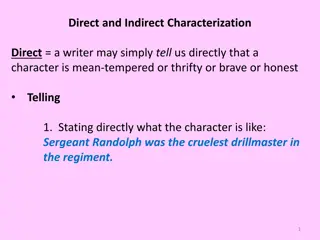Mastering Direct and Indirect Speech: A Comprehensive Guide
Explore the world of direct and indirect speech with this in-depth lesson on narration. Learn how to speak using both methods, transform sentences from direct to indirect, and discover the nuances of backshift of tenses and adverbs. Gain a better understanding of how grammatical changes occur between direct and indirect speech through practical examples and explanations provided by Assistant Teacher Saiful Islam from Shahjalal High School.
Download Presentation

Please find below an Image/Link to download the presentation.
The content on the website is provided AS IS for your information and personal use only. It may not be sold, licensed, or shared on other websites without obtaining consent from the author.If you encounter any issues during the download, it is possible that the publisher has removed the file from their server.
You are allowed to download the files provided on this website for personal or commercial use, subject to the condition that they are used lawfully. All files are the property of their respective owners.
The content on the website is provided AS IS for your information and personal use only. It may not be sold, licensed, or shared on other websites without obtaining consent from the author.
E N D
Presentation Transcript
NARRATION English 2nd Paper Lesson No -06 Conducted by MD. SAIFUL ISLAM Assistant Teacher Shahjalal High School
Learning Outcomes At the end of the lesson students will be able to Speak in using direct method, 1 Speak in using indirect method too, 2 Transform from direct to indirect. 3
Direct and Indirect Speech or Narration Contents * Introduction *Direct speech *Indirect speech(Reported Speech) *Difference between the two *Change to indirect speech *Back shift of tenses *Change in adverbs/expressions of time *No back shift *conclusion
Time: on Saturday evening I m Jessi from Sylhet. I hate studying Grammar. I m sure I make a lot of mistakes when I speak. But I don t care. I m happy people understand me mostly. Aslam Jessi
Time: on Sunday morning The girl (She) said (that) she was Jessi from Sylhet. She hated studying Grammar. She was sure she made a lot of mistakes when she spoke. But she did not care. She was happy people understood her mostly. Aslam Karim
Why grammatical changes between direct and indirect speech? Words that are spoken or thought in one place by one person may be reported in another place at a different time, and perhaps by another person. Because of this, there are often grammatical differences between direct and indirect speech.
Direct and Indirect speech When we report people s words, thoughts, beliefs etc. we can give the exact words (more or less) that were said, or that we imagine were thought. This kind of structure is called directspeech . We can also make somebody s words or thoughts part of our own sentence, using conjunctions (e.g. that) and changing pronouns, tenses and other words where necessary. This kind of structure is called indirectspeech or reported speech .
Direct speech (Quoted Speech) The The listener The speaker narrator Tom said said I am very busy now. I am very busy now. David Harry Tom David tells Harry at a different time
Direct speech Let s work out the rules! Structure of sentence Clause 1 Clause 2 I am very busy now, said Tom. actual words of the speaker with no change/ reported Speech Narrative part/ Reporting Verb Use of quotation marks Outside the quotation marks
What is indirect speech? (Reported speech) The Speaker The The listener reporter Tom said he was very busy then. I am very busy now.
Rules of indirect speech (reported speech) Tom said, Iam very busy now . (direct) Tom said he was very busy then. (indirect) Change in the exact words of the speaker No use of speech marks The pronoun I is changed to he . The verb am is changed to was . The adverb now is changed to then . You can add an optional conjunction that in place of comma. e.g. Tom said that he was very busy then.
Remember that can usually be omitted after reporting verb say and tell +object. But it should be kept after other verbs: complain, explain, object, point out, protest etc.-Thomson & Martinet
Indirect Speech change of pronouns 1st Person will be followed by Subject He said to me, I have called you today. He told me that he had called me that day. 2nd person will be followed by Object He said to me, You have called me today. He told me that I had called him that day.
3rd person is unchanged I said to you, He has called me today. I told you that he had called me that day.
Indirect Speech change of pronouns It s logical to change the pronouns: (think yourself as reporters) Ahmad said, I like to fly kites . Ahmad said ____ liked to fly kites. I have bought balloons for my sister Harry said. Harry said _______ had bought balloons for ______ sister. Emma said to her mother, I was feeding my kitten. Emma told ______ mother _______ had been feeding __________ kitten. her he he his her she
Indirect Speech change of pronouns I he/ she we they mine his/ hers/ours me him/her ours theirs us them myself/ourselves himself/herself/ themselves
Verb change Direct speech Indirect speech V1 (Go) V2(went) V2(Went) had+V3 (had gone) had+V3(had gone) had+V3(had gone)
Indirect Speech Tense change When you report the speaker s words, at a different time & place move back in TIME. Present and Future into past Past into past perfect Back shift
Back shift of Tenses Direct speech Indirect speech She said it was(v2) cold. Past Simple She said shewas(v2) teaching English online. Past Continuous She said she had(v2) been browsing the web since 1999. Past perfect continuous She said, "It is(v1) cold. Present Simple She said, "I am(v1) teaching English online." Present Continuous She said, I have(v1) been browsing the web since 1999. present perfect continuous
Back Shift of Tenses Direct speech Indirect speech She said, I have(v1) browsed the web . Present Perfect She said, "I taught(v2) online yesterday. Simple Past She said, "I was(v2) teaching earlier." Past Continuous She said she had(v2) browsed the web. Past Perfect She said she had taught (v3)online the day before. Past Perfect She said she had been(v3) teaching earlier. Past Perfect Continuous
Back shift(modal auxiliaries) Direct speech Indirect speech She said, "I'll teach English online tomorrow. She said, I can teach English online. She said, "I must have a computer to teach English online. She said, I may be late She said she would teach English online tomorrow. She said she could teach English online. She said she had to/must have a computer to teach English online. She said she might be late.
Modal Auxiliaries Direct speech Indirect speech may can will/shall(future) must should could might ought to would used to might could would must/ Had to Should could might ought to would used to no back shift
Expressions of time Direct speech Indirect speech today yesterday tomorrow next week/year etc. last week now last night these this(time expression) this(adj.) that day the day before/previous day the next day/the following day the following week/year etc. previous week then the night before those that the
Indirect Speech No back shift Remember! If you are reporting a fact: All that glitter is not gold , said grandma.(direct speech) Grandma said all that glitter is not gold. (indirect speech) When you report a permanent situation: Copernicus concluded, Earth revolves round the sun . (direct speech) Copernicus concluded earth revolves round the sun. (indirect speech) Contd.
Indirect Speech Remember! no backshift is possible. If direct speech is in the PAST PERFECT I had already toldhim the news, Tom told me.(direct) Tom told me he had already told him the news. (indirect) PAST PERFECT CONTINUOUS Ali said, I had been browsing the internet for ages. (direct) Ali said he had been browsing the internet for ages. (indirect) Past forms of modal auxiliaries e.g. could, would, should etc.
Indirect Speech (Review) Change in speaker s words Removal of commas Change of pronouns (First and second person pronouns shift to third person) Back shifting of tense ( a step back into PAST) Change of adverbs of time/ time expressions ( cont.)
Indirect speech Review Tense of the verb is not back shifted when you report a fact or a permanent situation actual words are in past perfect/ past perfect continuous past forms of modal verbs Reporting words that have just been spoken with reference to present time and the reporting verb is say/ says or tell/tells
Indirect speech Learning check Emma said to her mother, I have wrapped the gift . Emma told her mother _________________ the gift. she had wrapped Father said, If I can, I ll pick you up at school today. Father said that if ________ ,____ up at school ________ The sun rises in the east ,the teacher told the children. The teacher told the children the sun _______ in the east. ( cont.) he could that day. he would pick me/us_________________ rises
Indirect speech Learning check The gardener said to me, I had been trimming the hedge for two hours. The gardener told me _____________________the hedge for two hours. he had been trimming We must go early tomorrow , said my father. My father said __________________ go early ____________ they must go/ had to the next day. The teacher is saying, you are late in the class . The teacher is saying ________________ late in the class. you/ they/ we are
Usage Direct speech is found in conversations in books, in plays, and in quotations. Indirect speech is normally used when conversation is reported verbally, though direct speech is sometimes employed here to give a more dramatic effect.
Thank you all for joining me.
